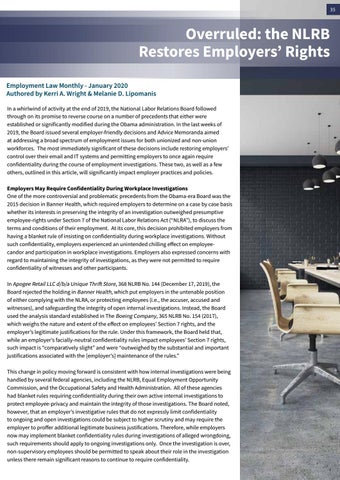35
Overruled: the NLRB Restores Employers’ Rights Employment Law Monthly - January 2020 Authored by Kerri A. Wright & Melanie D. Lipomanis In a whirlwind of activity at the end of 2019, the National Labor Relations Board followed through on its promise to reverse course on a number of precedents that either were established or significantly modified during the Obama administration. In the last weeks of 2019, the Board issued several employer-friendly decisions and Advice Memoranda aimed at addressing a broad spectrum of employment issues for both unionized and non-union workforces. The most immediately significant of these decisions include restoring employers’ control over their email and IT systems and permitting employers to once again require confidentiality during the course of employment investigations. These two, as well as a few others, outlined in this article, will significantly impact employer practices and policies. Employers May Require Confidentiality During Workplace Investigations One of the more controversial and problematic precedents from the Obama-era Board was the 2015 decision in Banner Health, which required employers to determine on a case by case basis whether its interests in preserving the integrity of an investigation outweighed presumptive employee-rights under Section 7 of the National Labor Relations Act (“NLRA”), to discuss the terms and conditions of their employment. At its core, this decision prohibited employers from having a blanket rule of insisting on confidentiality during workplace investigations. Without such confidentiality, employers experienced an unintended chilling effect on employeecandor and participation in workplace investigations. Employers also expressed concerns with regard to maintaining the integrity of investigations, as they were not permitted to require confidentiality of witnesses and other participants. In Apogee Retail LLC d/b/a Unique Thrift Store, 368 NLRB No. 144 (December 17, 2019), the Board rejected the holding in Banner Health, which put employers in the untenable position of either complying with the NLRA, or protecting employees (i.e., the accuser, accused and witnesses), and safeguarding the integrity of open internal investigations. Instead, the Board used the analysis standard established in The Boeing Company, 365 NLRB No. 154 (2017), which weighs the nature and extent of the effect on employees’ Section 7 rights, and the employer’s legitimate justifications for the rule. Under this framework, the Board held that, while an employer’s facially-neutral confidentiality rules impact employees’ Section 7 rights, such impact is “comparatively slight” and were “outweighed by the substantial and important justifications associated with the [employer’s] maintenance of the rules.” This change in policy moving forward is consistent with how internal investigations were being handled by several federal agencies, including the NLRB, Equal Employment Opportunity Commission, and the Occupational Safety and Health Administration. All of these agencies had blanket rules requiring confidentiality during their own active internal investigations to protect employee-privacy and maintain the integrity of those investigations. The Board noted, however, that an employer’s investigative rules that do not expressly limit confidentiality to ongoing and open investigations could be subject to higher scrutiny and may require the employer to proffer additional legitimate business justifications. Therefore, while employers now may implement blanket confidentiality rules during investigations of alleged wrongdoing, such requirements should apply to ongoing investigations only. Once the investigation is over, non-supervisory employees should be permitted to speak about their role in the investigation unless there remain significant reasons to continue to require confidentiality.

















